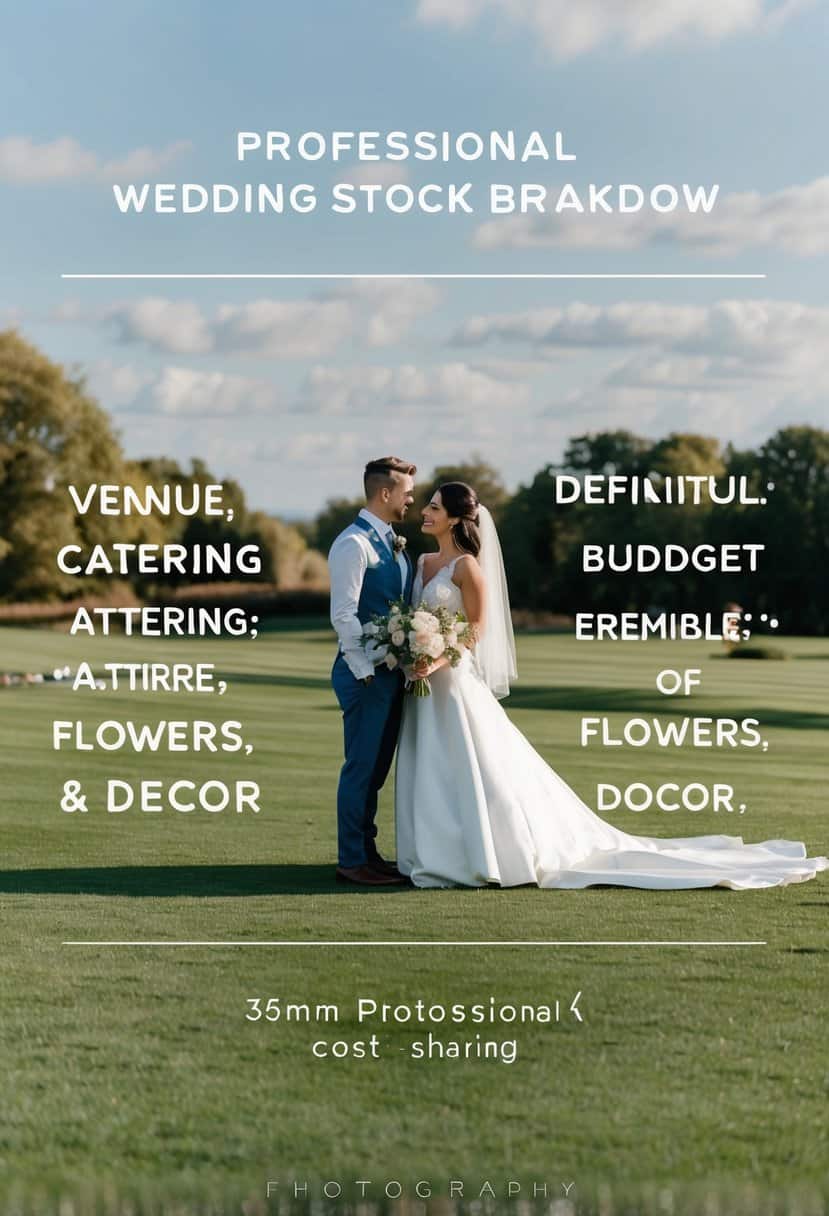Do Couples Split Wedding Costs? A Modern Approach to Budgeting Together
Planning a wedding brings up the big question of who pays for what. Nowadays, couples often share the financial responsibility of their wedding. Many couples often split the costs with their families, or cover them entirely on their own.

Traditionally, different families took on specific expenses, but this has evolved over time. With more modern weddings, you might see conversations about budgeting and splitting costs between both families or just the couple. This approach allows for flexibility and can relieve some stress from the planning process.
Discussing finances can feel tricky, but open communication makes it easier. Understanding what works best for your unique situation will ensure everyone feels comfortable and happy with the arrangements.
Understanding Wedding Costs

Planning a wedding involves managing various costs that can vary widely depending on choices. Understanding the basics of budgeting and knowing the average expenses will help you navigate your wedding plans more effectively.
The Basics of Wedding Budgeting
When setting up your wedding budget, start by identifying your priorities. Decide which parts of the wedding are most important to you, such as the venue, catering, or photography. This can help allocate funds where they matter most.
Creating a detailed budget breakdown can simplify this process. Consider listing each element, like attire, venue, flowers, and entertainment, with estimated costs. Communication is key. Talk openly with your partner and any family members who may be contributing financially.
Financial contributions can come from multiple sources, including family or personal savings. Allocating clear roles and responsibilities can prevent misunderstandings and ensure everyone is on the same page.
The Average Cost of a Wedding
The average cost of a wedding can range significantly based on location, guest count, and personal preferences. On average, weddings in the United States can cost anywhere from $20,000 to $30,000. However, keep in mind that this can vary with some spending more and others less.
Breaking down costs can provide clarity. For example, catering costs often take up a large portion of the budget, sometimes accounting for 30-40% of the total expenses. Venue costs can also be significant, with some couples spending thousands on their ideal location.
It’s beneficial to research prices in your area and compare different options to find what fits your budget best. Planning strategically will help keep your finances in check while still creating the celebration you envision.
Who Pays for the Wedding?

When it comes to weddings, there are various ways the expenses can be split. Traditionally, the bride’s family takes on a lot of the costs, but modern couples are finding new ways to share these expenses.
Traditional Payment Responsibilities
Traditionally, many wedding costs are covered by the bride’s family. They are often expected to pay for the ceremony, reception, and decorations. This includes everything from the venue rental to catering services. The bride’s attire and accessories also typically fall under their responsibility.
The groom’s family usually pays for specific items such as the rehearsal dinner and the groom’s attire. They might also handle transportation on the wedding day and sometimes even the wedding officiant’s fee. The groom is generally responsible for purchasing both the engagement and wedding rings.
For more details on these traditional roles, you can check the Vogue article.
Modern Approaches to Wedding Expenses
Today, more couples are choosing to share wedding costs with or without their families’ help. This often leads to both families contributing based on their abilities rather than tradition. For many millennial couples, parents cover a significant portion, with some paying up to 56% of the expenses.
Budget conversations are important when deciding who will pay for what. This ensures that everyone is on the same page and that no one feels burdened.
Many couples opt to take on more financial responsibility themselves, aiming for independence. This can mean splitting costs evenly between the couple or dividing them in other ways that suit their situation.
Key Wedding Elements and Associated Costs

Planning a wedding involves considering several key elements that contribute to the overall experience and cost. From choosing a venue and catering to selecting attire and rings, each part plays a vital role in your special day.
Venue and Catering
The venue is often one of the biggest expenses in a wedding budget. Prices can vary based on location, size, and the amenities offered. Popular venues might require booking well in advance.
Catering usually takes a large chunk of the budget too. Whether you decide on a buffet, plated meal, or food stations, the cost per guest can add up quickly. Don’t forget to consider the price of the wedding cake, which can be a significant part of the catering budget.
Attire and Rings
When it comes to attire, the wedding dress often takes center stage. Dresses can vary widely in price depending on style and designer. You’ll also need to consider outfits for the groom and the bridal party.
Rings are another important part of your budget. While the engagement ring is often purchased before wedding planning begins, you’ll need to add in the cost of the wedding rings. These can vary significantly based on metal and design choice.
Photography and Videography
Capturing the memories of your wedding day is essential, which makes photography and videography crucial. Finding the right wedding photographer who fits your style can involve substantial costs.
Many couples invest in both photography and videography to ensure comprehensive coverage. Packages may include engagement sessions, full-day coverage, and albums, each impacting the total cost. It’s important to review different packages and understand what each includes to find the best fit for your budget.
Planning and Organizing the Wedding

Efficient wedding planning involves understanding the role of a wedding planner, managing your guest list and invitations, and preparing for essential pre-wedding events. By focusing on these key areas, you can streamline the process and enjoy a more seamless experience.
The Role of a Wedding Planner
A wedding planner can be an invaluable asset in making your big day run smoothly. They help you create a budget, scout venues, and pick vendors. Their experience can save you time and stress.
You’ll find that planners have a network of trusted vendors, which may even get you discounts. They coordinate logistics, so you can focus on enjoying your engagement.
Whether you want a full-service planner or just someone for day-of coordination, there’s an option to fit your needs and budget.
If organizing details isn’t your strength, hiring a planner might be the perfect solution. They make sure everything flows seamlessly and can give advice on trends and etiquette. Remember to communicate your vision clearly to ensure your day reflects your style.
Invitations and Guest Management
Sending out invitations is an exciting step in the wedding preparation process. Choosing the right design sets the tone for your wedding. You can opt for traditional, modern, or themed invitations that match your personal style.
Besides aesthetics, managing your guest list is crucial. A streamlined guest management system can help track RSVPs and dietary preferences. This is vital for planning seating arrangements and ensuring everyone feels welcome.
Online tools can assist with sending digital invitations and collecting responses. This method is eco-friendly and often quicker than traditional mail.
Having a clear process for inviting guests and tracking who’s coming will help you stay organized and reduce last-minute stress.
Pre-Wedding Events
Pre-wedding events like engagement parties, bridal showers, and the rehearsal dinner are excellent opportunities to celebrate before the big day. The engagement party is typically the first event after announcing the engagement, providing a chance for both families to meet.
The bridal shower, often hosted by close friends or family, is another celebration leading up to the wedding. It’s a time for the bride to receive gifts and well-wishes.
The rehearsal dinner usually takes place the night before the wedding and is an intimate gathering for the wedding party and closest family members. These events help build excitement and let you spend quality time with loved ones. Planning these in advance ensures they are enjoyable and stress-free.
Additional Wedding Expenses

Planning a wedding involves more than just the ceremony and reception. There are extra costs that can surprise you if you’re not prepared. These include gifts and favors for your guests and post-wedding matters like thank-you cards and managing the honeymoon fund.
Gifts and Favors
When planning your wedding, think about gifts for your wedding party and special guests. Bridesmaid and groomsmen gifts are a thoughtful way to show appreciation. These can range from personalized items to practical gifts.
Welcome bags are another popular option. These usually include snacks, water, and a little note welcoming guests to the celebration. You can also consider small favors for each guest. These often include items like candles, custom cookies, or small plants. They’re a nice touch that leaves a lasting impression.
Post-Wedding Matters
After the big day, there are a few tasks left to tackle. First, make sure to send thank-you cards to everyone who attended your wedding and gave gifts. Personalize each message with a specific note about the gift received.
Then comes the honeymoon. Sometimes, couples set up a honeymoon fund as part of their registry. This helps cover travel and honeymoon expenses and is a practical alternative to traditional wedding gifts. Make sure to plan your finances carefully to avoid stress when starting your new life together.


